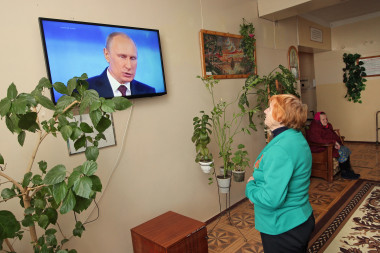
Ukraine’s Ineffectual Information Ministry: Underfunded or Misconceived?
Publication: Eurasia Daily Monitor Volume: 12 Issue: 75
By:

Informational warfare has been a critical part of Russia’s hybrid war against Ukraine. As Russian military reporter and veteran of the Russia’s two wars in Chechnya, Arkadiy Babchenko, argues, “I believe this [the ongoing Russian-Ukrainian war] is the first war in the entire history triggered solely by Goebbels-style propaganda. Had it not been for Russian TV, this war would never have happened” (Openrussia.org, April 15). Faced by such a formidable challenge, the Ukrainian government’s solution to the problem—the formation of a cabinet-level information ministry—fails both in form and in fact.
On December 2, 2014, many months since the start of Russian aggression and after many years of tolerating Russian propaganda in the Ukrainian media space, Ukraine’s parliament gave the green light to the formation of the Ministry of Information Politics. The new ministry will “assist communication among state bodies, create the country’s information strategy and respond to foreign information attacks” (Mip.gov.ua, accessed April 17).
The vote on the new agency—buried within a larger bill—was pushed through the legislature with little public notice and even less debate, immediately sparking criticism. Yuriy Stets, the would-be information minister, who had earlier produced the Fifth TV channel (controlled by President Petro Poroshenko) and was the president’s close personal friend (Pravda.com.ua, April 10, 2013), did not even speak before the vote—unlike his colleagues.
Stets made public the new ministry’s regulations only a day after the vote. He said his ministry’s activities will be informed by the experience of Great Britain and France after World War I, as well as that of Israel. According to him, the ministry was going to “develop and implement professional standards in media sphere,” “ensure freedom of speech” and prevent personal harm caused by “incomplete, outdated or unreal information” (Kyiv Post, December 4, 2014).
However, journalists and watchdog groups broadly consider the new ministry an ill-conceived idea, fearing it will try to regulate the media, restrict free speech and inhibit reporters’ work (Kyiv Post, December 4, 2014). Many also believe the information ministry will be a waste of money. “The country is now collecting money for bullet-proof vests, but we found [state] money for the ministry,” complained Nastya Stanko, from Hromadske TV (Facebook.com/nastya.stanko, accessed April 17).
Stets assured that his ministry was going to use four million hryvnia (about $180,000) out of 2015 budget funds for salaries for its 30 officials and to rely on foreign donors or grant money for other expenses (Pravda.com.ua, February 17, 2015; December 3, 2014). But when commenting on his first 100 days in office, the minister complained that he had not been able to accomplish anything, as he had no access to state funds (Zik.ua, February 22). According to Stets, his agency has been working on drafting a Concept of Information Security (Mip.gov.ua, March 17, 18) to be completed by this May, which would be followed by public discussions until September, when it may be finally approved by the legislature.
Compared to the Ukrainian government’s slow process in conceiving new ideas with which to confront Russian information warfare, Ukraine’s volunteer sector has long ago taken the initiative, just like in the case of the shooting war. Even the information ministry’s website has been designed and hosted entirely by unpaid volunteers (Slovoidilo.ua, March 16). Tapping into the wide pool of ready volunteers and the entire nation’s patriotic sentiments, Stets’ agency launched the so-called Ukrainian Information Army (I-army.org), a volunteer force of Internet commentators tasked with spreading government-approved content and combating Russian trolls.
Though lacking funds, Minister Stets also announced plans to found Ukraine Tomorrow, a worldwide TV channel to “counter Russia’s formidable propaganda machine” (Mip.gov.ua, March 16; Deutsche Welle–Russian service, February 22). Yet, the information ministry has, until recently, been unable to even secure the broadcasting of domestic TV networks over the country’s entire territory, to let alone the globe. Thus, Moscow-backed rebels in Luhansk and Donetsk used Ukrainian equipment and state funding to transmit Kremlin propaganda (Sprotyv.info, December 25, 2014). Stets only declared in mid-March that Ukraine’s TV channels were finally again being broadcast to the occupied eastern regions thanks to transmitters donated by Poland. He also noted plans to restore radio broadcasts to Russian-annexed Crimea (Radiosvoboda.org, March 21).
Creating one more TV channel—like Ukraine Tomorrow—would be useless, believes Iaroslav Kovalchuk, from the Kyiv-based International Center for Policy Studies (Apostrophe.com.ua, March 11). Critically, it would compete with pre-existing UTR Worldwide Service and Ukraine Today, English-language channels launched by Ukraine’s state-run broadcasting company and Igor Kolomoisky’s 1+1 Media group, respectively (Deutsche Welle–Russian service, February 27).
Grygoriy Shverk, the deputy chairman of Ukraine’s National TV and Radio Council, estimates the new TV channel would cost $5–10 million a year in just maintenance fees, compared to the information ministry’s entire annual budget of $180,000 and would be trying to compete with the billions of dollars Russia pumps into its TV propaganda effort each year (Apostrophe.com.ua, March 11). Whereas Oksana Romaniuk, the director of the Kyiv-based media watchdog Institute of Mass Information and Ukraine’s representative for Reporters Without Borders, criticizes the Ukrainian government’s unproductive, symmetric attempts at “battling propaganda with propaganda” (Deutsche Welle–Russian service, February 27). “There is no place for creativity in the present-day bureaucratic machine,” Kovalchuk maintains, arguing that the state should have instead backed existing private ventures.
Even anonymous officials from the presidential administration asserted that “the way to fight Russian propaganda is with honesty and transparency, not trying to beat Russia at its own game” (Mashable.com, December 2, 2014. According to Romaniuk, Ukraine should do more to “integrate Ukraine into global news coverage, specifically by providing access [to Ukraine] to foreign correspondents, by encouraging international broadcasters to open their offices in Ukraine, as well as by improving the operational pace and quality of the governmental bodies’ press services, namely those of the defense and security agencies.” These agencies’ blunders, Romaniuk notes, “have been one of the reasons for [Ukraine’s] defeats in the information war” (Deutsche Welle–Russian service, February 27). To this list, journalist Oleksandr Kochetkov adds a need for involving famous and respected global media personalities (Obozrevatel.com, February 2).
“This country was saved by volunteers, including in the information field,” says Dmytro Kuleba, the Ukrainian foreign ministry’s ambassador-at-large. “So to secure Ukraine’s efficient information policy, it is necessary to synergize efforts of our governmental agencies, civil society and international partners,” he concludes (Apostrophe.com.ua, March 11).
Ukraine clearly needs to adopt and follow a well-developed information policy. But as experts and professional journalists maintain, so far Kyiv has unwisely tried to reinvent the wheel or imitate the better-funded, more experienced Russian “information warriors.”




